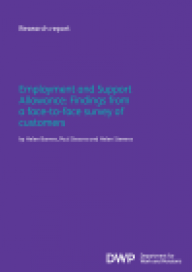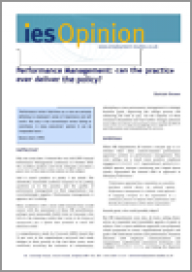Publications
 We author and publish a range of resources to keep you up to date with the latest developments in employment, labour market and human resource policy and practice.
We author and publish a range of resources to keep you up to date with the latest developments in employment, labour market and human resource policy and practice.
All our pdf publications are free to access.
-

West London HR Consortium: Report of learning set on HR communication and integration
Hirsh W, Reilly P | Dec 2010 | Capital AmbitionFollowing on from research by the Institute for Employment Studies on What Customers Want from HR and a series of workshops run for London Councils during 2009, two strong themes emerged: how the HR function facilitates effective people management and how it relates to its internal customers: senior managers, line managers and employees. These questions became more pertinent during the course of the project as Councils were operating in an environment where serious cost reductions were required and the HR function had to identify how it caould best support a period of challenging change as well as addressing various HR issues within the function.
-

Perspectives and Performance of Investors in People
A Literature Review
Gloster R, Sumption F, Higgins T, Cox A, Jones R | Dec 2010 | UK Commission for Employment and SkillsIn April 2010, the UK Commission took over strategic ownership of the Investors in People (IIP) Standard. This evidence review draws on a wide range of research from the previous ten years to develop a deeper understanding of how IIP is perceived and to provide evidence of the impact of the Standard on the businesses that are accredited. The review provided the UK Commission with a consistent narrative on IIP to date.
-

Using Jobcentre Plus Services: Qualitative evidence from ethnic minority customers
Marangozov R, Bellis A, Barnes H | Nov 2010 | Department for Work and Pensions (DWP)This research explored the experiences of ethnic minority customers using Jobcentre Plus services to identify any specific issues and how these might usefully be addressed. The research involved 83 in-depth, face-to-face interviews with Jobcentre Plus customers in four locations across England. Customers were from Bangladeshi, Pakistani, Indian, Chinese, black Caribbean, black African, ‘Mixed’ and ‘Other’ ethnic backgrounds. White British customers were also included to explore whether the experiences reported were typical of the entire population sampled or unique to specific ethnic groups.
-

Employment and Support Allowance: Customer and Staff experiences of the face-to-face Work Capability Assessment and Work-Focused Health-Related Assessment
Barnes H, Aston J, Williams C | Nov 2010 | Department for Work and PensionsThis report presents findings from qualitative research on the Work Capability Assessment (WCA) and Work-Focused Health-Related Assessment (WFHRA). The research was carried out in spring/summer 2010 and included Employment and Support Allowance customers, Jobcentre Plus and Pathways to Work Provider Personal Advisers, and Atos Healthcare staff working on these assessments.
-

Creative Career Stories
Ball L, Pollard E, Stanley N, Oakley J | Oct 2010 | Centre for Learning and Teaching in Art and Design, University of the Arts LondonCreative Career Stories is the second report of the Creative Graduates Creative Futures longitudinal study of the early careers of more than 3,500 creative graduates, undertaken between 2008 and 2010. It draws on findings of qualitative research, providing further insights into creative careers some five to seven years after graduation. It explores through narratives the connections graduates make between their courses and careers, in their own words.
-

Employment and Support Allowance: Findings from a face to face survey of customers
Barnes H, Sissons P, Stevens H | Oct 2010 | Department for Work and Pensions (DWP)This report presents the first findings of a representative face-to-face survey of 3,650 Employment and Support Allowance claimants. It was carried out between December 2009 and February 2010 by Ipsos MORI. The sample consisted of those who made a claim for ESA between April and June 2009, allowing a sufficient gap for the majority to have had a decision on the outcome of their claim by the time of the survey.
-
📄
Work-Related Stress
Broughton A | Oct 2010 | European Foundation for the Improvement of Living and Working Conditions, DublinThis report examines the issue of work-related stress in the 27 EU Member States and Norway. Studies capturing data on work-related stress in individual countries differ in terms of their scope, methodology and coverage.
-

Extending flexicurity
The potential of short-time working schemes
Mandl I, Storrie D, Hurley J, Mascherini M, Broughton A, Owczarzak R, Riso S, Salvatore L | Oct 2010 | European Monitoring Centre on ChangeIn the face of recession, falling demand and the consequent slowing of production, short-time working and temporary layoff schemes have been extended (or introduced) in many Member States. These schemes, often with the aid of public funds, reduce working time, while protecting workers’ incomes and company solvency; frequently, the time spent not working is used for training instead. This report examines the practice of reduced working time across Europe, and looks in detail at how it is implemented in ten Member States, with a view to determining the contribution that such schemes can make in implementing the common principles of flexicurity, especially in light of the broad-based consensus they enjoy among the social partners.
-
📄
European Restructuring Monitor Quarterly - 2010, Issue 3
Hurley J, Riso S, Salvatore L, Ford B, Miginis M, Broughton A | Oct 2010 | European Monitoring Centre on ChangeThe pace of recovery following the 2008–9 economic crisis picked up somewhat throughout 2010 with the EU forecast to register 1.7% growth in 2010. Uncertainty however persisted on a number of fronts. Fears of a double dip recession in the US economy were reinforced by weak employment and growth data. Global growth appeared increasingly to depend on demand from developing countries, notably the BRIC bloc.
-

Performance Management: Can the practice ever deliver the policy?
Brown D | Oct 2010 | Institute for Employment StudiesPerformance management, it appears, isn’t working.
